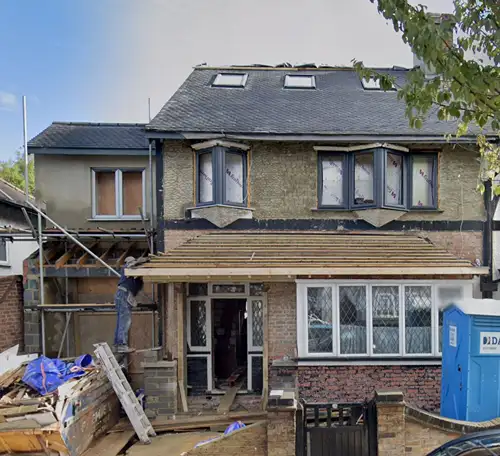
Many mortgages for over 60s do not feature on the leading comparison sites.
Starlight Later Life is a new direct lender that does not require the use of a broker or advisor.
Starlight offer:
- A free, no-obligation home valuation
- Loan to value of up to 70%
- No lender, broker or advisor fees
- 3.99% APRC fixed for life
- Ideal product to pay off an existing mortgage
- No early repayment charges
- Portable product ready for if you want to move house
- No upper age limit
- No fixed term or end date
- Ideal for family gifting or tax planning
- Penalty-free payment holidays
- No fee further advances if you need more money or your home has gone up in value
Please complete the form below for a free valuation from Starlight.




Does the Rio mortgage calculator suggest the maximum you can borrow based on your income and home value?
The exact functionality of a Retirement Interest Only (RIO) mortgage calculator can vary depending on the specific tool or calculator you are using. However, many RIO mortgage calculators are designed to estimate the maximum amount you can borrow based on your income, home value, and other financial factors.
Typically, you would input details such as your income, your partner’s income (if applicable), the value of your home, and any outstanding mortgage balance. The calculator then calculates the maximum loan amount you might qualify for under an RIO mortgage, taking into account the lender’s criteria and standard affordability assessments.
Remember that the results from such calculators are typically estimates and should not be considered formal offers. For accurate information and to explore your RIO mortgage options further, it’s advisable to consult with mortgage advisors or directly with lenders who can conduct a more comprehensive assessment of your eligibility and provide specific loan offers based on your circumstances.


Are the best Rio mortgages rates only available to people with a low loan to value?
While a lower loan-to-value (LTV) ratio can potentially lead to more favourable Retirement Interest-Only (RIO) mortgage rates, it’s not the sole factor determining the best rates. LTV is one of many factors that lenders consider when determining mortgage rates.
A lower LTV, which means you have a higher percentage of equity in your home, generally makes you a lower-risk borrower. This can lead to more competitive RIO mortgage rates because lenders perceive less risk in lending to you.
However, other factors also significantly secure the best RIO mortgage rates, including your credit history, income, age, and the lender’s policies. Some lenders may prioritize different aspects of your application, so it’s essential to shop around, compare offers from various providers, and seek advice from mortgage advisors who can help you find the most suitable RIO mortgage with competitive rates based on your unique circumstances.


How quickly do lifetime mortgage providers release the funds after a formal offer?
The speed at which lifetime mortgage providers release funds after a formal offer can vary depending on the specific lender and the complexity of your case. Generally, it takes several weeks from the formal offer stage to the release of funds, but several factors can influence the timeline:
- Application processing: The lender needs time to process your application thoroughly, which includes verifying your financial information and property details.
- Legal work: Legal checks and processes, such as property valuations and title searches, may need to be completed, which can add to the timeline.
- Third-party involvement: If third parties, such as solicitors or surveyors, are involved, their schedules and efficiency can impact the process.
- Your responsiveness: Timely submission of required documents and responses to lender queries can expedite the process.
- Lender’s internal procedures: Each lender may have its internal procedures and turnaround times, which can vary.
To get a more accurate estimate of how quickly a specific lifetime mortgage provider can release funds after a formal offer, it’s recommended to inquire directly with the lender and your solicitor or advisor. They can provide a more precise timeline based on your unique situation.


Are the best RIO mortgage rates UK dependent on your income?
The best Retirement Interest Only (RIO) mortgage rates in the UK can be influenced by various factors, including income. While RIO mortgages are designed to be accessible to retirees, lenders may still consider your income as part of their affordability assessment.
Your income helps lenders gauge your ability to meet the interest payments on the RIO mortgage. Generally, a higher income may lead to more favourable RIO mortgage rates because it suggests a stronger loan repayment ability. However, other factors like your credit history, the amount of equity in your home, and the lender’s policies also play a significant role.
It’s important to note that RIO mortgages often have less stringent income requirements than traditional mortgages, as they may consider sources of income like pensions, investments, or rental income. To find the best RIO mortgage rates for your specific income level and financial situation, it’s advisable to shop around, compare offers from different lenders, and consult with a mortgage advisor for personalized guidance.



How common is it to use equity release to pay off interest only mortgage in 2025?
Some individuals, especially those over 55 with substantial home equity, employ equity release to pay off an interest-only mortgage. Like in previous years, the popularity of this approach in 2025 depends on various factors, including individual financial circumstances, awareness of equity release options, and evolving market conditions.
Equity release products, such as lifetime mortgages or home reversion plans, allow homeowners to release a portion of their home’s equity, which can then be used to pay off an interest-only mortgage or meet other financial needs. The decision to pursue this route depends on factors like the size of the mortgage, the availability of alternative funds, and personal preferences.
The usage of equity release for this purpose may have increased in recent years due to a growing aging population and the need for financial solutions to address interest-only mortgage repayments. However, it’s essential for individuals considering equity release to research the options thoroughly, understand the implications and seek independent financial advice to make informed decisions based on their unique circumstances.


Who offers the best retirement interest only mortgage rates 2025?
Determining the best Retirement Interest Only (RIO) mortgage rates in 2025 can be influenced by various factors, including your personal financial situation, the type of RIO mortgage you’re looking for, and market conditions. Mortgage rates can change frequently, and what may be considered the best rate today may not be the same in the future.
To find the most favourable RIO mortgage rates for your specific circumstances, it’s recommended to:
- Shop around: Contact multiple lenders, including banks, building societies, and specialist RIO mortgage providers, to compare their current rates and terms.
- Seek professional advice: Consult an independent mortgage advisor who can assess your needs and financial situation to help you find the most suitable RIO mortgage with competitive rates.
- Monitor the market: Monitor financial news and market trends to stay informed about any changes in interest rates or new RIO mortgage products.
Remember that your best RIO mortgage rate will depend on your unique requirements. Therefore, it’s essential to consider all aspects of the mortgage, including fees, terms, and interest rate.



Does the retirement interest only mortgages calculator help you work out affordability?
Yes, the Retirement Interest Only (RIO) mortgage calculator can help you determine affordability to some extent. Entering details such as your income, expenses, and other financial information can provide an estimate of the maximum loan amount you might qualify for under an RIO mortgage.
However, it’s important to remember that the calculator’s results are just a preliminary assessment and should not be considered definitive. Lenders typically conduct a more thorough affordability assessment during the application process, considering additional factors like your credit history, age, and individual circumstances.
Therefore, while the calculator can offer a rough estimate, consulting with a mortgage advisor or the lender directly is essential for a comprehensive affordability assessment for an RIO mortgage.



Is the credit check for the Santander retirement interest only mortgage stringent?
The stringency of the credit check for a Santander Retirement Interest Only (RIO) mortgage can vary depending on your financial circumstances and the lender’s policies at the time of application. Generally, Santander, like other mortgage providers, thoroughly assesses your creditworthiness.
They will review your credit history, income, expenses, and financial situation. While they may be more lenient in certain aspects than traditional mortgages, they still aim to ensure you can afford the repayments and meet their lending criteria.
It’s advisable to maintain a good credit history and be prepared to provide documentation to support your application. Consulting with a mortgage advisor can help you understand the specific requirements and increase your chances of approval.

Are all remortgages for over 60s strictly regulated?
Remortgages for individuals over 60 are subject to regulatory oversight in the UK, but not all are strictly regulated similarly. The Financial Conduct Authority (FCA) provides regulations and guidelines to protect consumers, including those seeking remortgages. However, the level of regulation may vary depending on the type of mortgage and the lender.
Specific regulations ensure that certain specialized products, like Retirement Interest Only (RIO) mortgages, are suitable for older borrowers. It’s essential to work with a reputable lender and seek independent financial advice to navigate the regulatory landscape and find the most appropriate remortgage option tailored to your needs.


Do I need a good credit history to access the best RIO mortgage rates?
A good credit history is crucial to accessing the best Retirement Interest Only (RIO) mortgage rates in the UK. Lenders consider your creditworthiness when determining the interest rate you’ll receive. A strong credit history demonstrates responsible financial management, making you a lower-risk borrower.
This, in turn, can lead to more favourable RIO mortgage offers with lower interest rates, potentially saving you money over the life of the mortgage. Maintaining and improving your credit score is essential to enhancing your chances of securing the best RIO mortgage rates.



Are Santander mortgages for over 60s safe?
Santander mortgages for individuals over 60 can be secure if you meet their eligibility criteria. The safety of the mortgage depends on your financial stability, ability to meet repayments, and the terms of the mortgage agreement.
Like other reputable lenders, Santander typically assesses applicants’ financial circumstances thoroughly. Before committing, understanding the terms, interest rates, and associated fees is essential. Additionally, consulting with a financial advisor can provide personalized guidance to ensure the safety and suitability of the mortgage for your specific situation.

Does the Rio mortgage calculator help you determine your loan-to-value ratio?
The Rio mortgage calculator can be a valuable tool for estimating your loan-to-value (LTV) ratio. By entering the property value and the amount you plan to borrow, it calculates the percentage of the property’s value that your loan represents.
This information can be valuable when assessing your eligibility for a RIO (Retirement Interest Only) mortgage, as many lenders have specific LTV requirements for such products. It helps you understand your financial options when considering a RIO mortgage in the UK.



Do the lenders with the best Rio mortgage rates offer a free valuation?
The availability of free valuations with the best Retirement Interest Only (RIO) mortgage rates varies among lenders. Some lenders offering competitive RIO mortgage rates may include free property valuations as part of their mortgage package, while others might charge for this service.
It’s essential to compare different RIO mortgage products and their terms, including any additional fees, such as valuation charges, to find the option that best suits your financial needs. Always review the specific terms and conditions each lender provides for detailed information.


Is there an upper age limit applied to Santander later life mortgages?
Santander’s later life mortgages do not impose an upper age limit. This approach accommodates older borrowers’ varying needs and circumstances, offering greater accessibility and flexibility in financial planning for later stages of life.
This policy reflects a growing trend in the mortgage industry to cater to an ageing population and their specific financial requirements.

Do most mortgages over 60 have a fixed term?
Most mortgages for over 60s, including Retirement Interest Only (RIO) mortgages, typically do not have a fixed term in the traditional sense. Instead, they often run for the lifetime of the borrower, with repayment usually due upon the borrower’s death, move into long-term care, or sale of the property.
This approach offers greater flexibility for older borrowers, aligning with their retirement plans and financial circumstances. However, terms can vary by lender, so reviewing specific product details is essential.


Do many later life mortgages have penalty-free payment holidays?
Many later life mortgages offer some flexibility, but penalty-free payment holidays are not universally available across all products. The availability of such features depends on the specific mortgage terms set by the lender.
It’s important to carefully review the mortgage agreement or consult with a lender or financial advisor to understand the specifics of the mortgage product, including any options for payment holidays and potential penalties or conditions attached to them.


What are the most common uses for mortgages for over 60s UK?
Mortgages for over-60s in the UK are commonly used for various purposes. These include downsizing to a more manageable property, accessing equity to supplement retirement income, undertaking home improvements, assisting family members financially, or consolidating existing debts.
Such mortgages provide financial flexibility, allowing older individuals to adapt their housing and economic needs to their stage in life.


How long does a remortgage for over 60s take to complete?
The time it takes to complete a remortgage for individuals over 60 can vary. Generally, the process can take several weeks to a few months, depending on various factors.
These include the complexity of your financial situation, the speed of the property valuation, the efficiency of the solicitors involved, and how quickly you can provide the necessary documentation.
Communicating regularly with your lender and solicitor is essential to ensure a smooth process.


Do Santander mortgages for over 60s require the use of a solicitor?
Yes, like any mortgage process, a solicitor is typically required for Santander mortgages for over-60s. The solicitor handles the legal aspects of the mortgage transaction, ensuring everything is legally sound and in your best interest.


Can I use a retirement interest only mortgage calculator, or are they just available to regulated brokers or advisors?
Retirement Interest Only (RIO) mortgage calculators are available for public use, not just for regulated brokers or advisors.
These calculators help individuals estimate potential repayments and understand how an RIO mortgage might fit their financial situation. It’s a helpful tool for initial planning before seeking professional advice.


Do all late life mortgages require the help of a broker or advisor?
While using a broker or advisor for late-life mortgages is not mandatory, it’s highly recommended. Navigating the complexities of mortgages at this stage, especially understanding terms, eligibility, and options like equity release, can be challenging.
An advisor can offer tailored guidance, ensuring you choose a suitable mortgage based on your financial circumstances and plans.


Mortgages for over 60s Money Saving Expert recommendations and advice for 2025
As of 2025, Money Saving Expert’s website does not have specific mortgage recommendations for people over 60. However, it offers a range of financial guides and tips that could be relevant for individuals in this age group looking for mortgage advice.
Conduct thorough research or consult with a financial adviser for personalized mortgage advice. For the latest information and guides from Money Saving Expert, visit MoneySavingExpert.com.


If I don’t pass affordability for a RIO mortgage, is my only option equity release?
Equity release is not your only alternative if you do not pass the affordability test for a Retirement Interest-Only (RIO) mortgage. Various options are available for older borrowers who may not qualify for an RIO mortgage.
- Lifetime Mortgages: These are a type of equity release product where you can borrow a lump sum against the value of your property. The loan and accrued interest are typically repaid when the borrower passes away or moves into long-term care. There are several types of lifetime mortgages, including drawdown plans (allowing you to withdraw money in smaller amounts), interest-only plans (where you make regular interest payments to control the final balance), and enhanced plans for those with certain health conditions.
- Home Reversion Plans: Another form of equity release, a home reversion plan, involves selling a part or all of your property to a provider in return for a lump sum or regular payments. You can continue living in the home rent-free under a lease until you pass away or move into care.
- Buy-To-Let Plans: If you have a buy-to-let investment portfolio, you can consider releasing money. This option might be suitable if you own additional properties that you rent out.
- Retirement Mortgages: These are residential mortgages that continue into retirement based on your income and affordability. They can be either interest-only or capital and interest mortgages, requiring monthly repayments.
- Standard Residential Mortgages: Some lenders offer traditional residential mortgages to older borrowers, provided they meet the maximum age criteria at the end of the mortgage term. These mortgages might have a shorter term and require evidence of income or pension forecasts.
It’s important to consult with a financial adviser or a mortgage broker to explore these options thoroughly and to understand their implications, especially for equity release products. An adviser can help you find a solution tailored to your financial situation and retirement plans.


Are all over 60 mortgages in the UK a fixed interest rate, or are there some variable rates?
Mortgages for individuals over 60 in the UK come in various forms, and depending on the product and the lender, they can feature either fixed or variable interest rates.
Fixed-rate mortgages are standard, where the interest rate remains constant for a set period. This provides stability in monthly repayments, making it easier for borrowers to budget. Typically, these can range from two-year to ten-year fixed-rate periods, with some lenders offering longer terms.
On the other hand, variable-rate mortgages have interest rates that can fluctuate during the initial deal period. These include tracker mortgages, where the rate is pegged above the Bank of England base rate and changes with it, and discount mortgages, which are set below the lender’s standard variable rate (SVR). While initial rates for variable deals can be lower than fixed rates, they carry the risk of rate increases, affecting monthly repayments.

The choice between fixed and variable rates depends on individual preferences and financial situations. Fixed-rate mortgages offer predictability, whereas variable rates can initially be lower but come with uncertainty regarding future rate changes.
It’s also important to note that mortgage options for over 60s are not limited to standard residential mortgages. They also include retirement interest-only mortgages, where you pay only monthly interest, and the loan is typically repaid when you die, move into long-term care, or sell your home. Moreover, equity release products like lifetime mortgages and home reversion plans are available, although they have risks and implications.
Given the range of products and the different criteria for each, consulting with a mortgage broker can be beneficial. They can help you navigate the various options and identify the lenders most likely to consider your application based on your financial circumstances and retirement plans.
For more details, refer to resources from money.co.uk and Uswitch. These provide comprehensive information about mortgages for people over 60, including the types of interest rates available.


With the leading lenders for mortgages for the over 60s are the acceptance rates very high in 2025?
In 2025, the mortgage market for individuals over 60 offers various options. However, acceptance rates for these mortgages can depend on several factors, including the specific lender’s criteria and the borrower’s financial circumstances. The types of mortgages available to those over 60 include standard residential mortgages, retirement interest-only mortgages, equity release schemes, and Older People’s Shared Ownership (OPSO) schemes. Each option has its criteria and suitability depending on individual needs and financial situations.
Several banks and building societies provide standard residential mortgages to those aged 65 and over. However, these may come with a shorter term, such as 10 to 15 years, compared to the standard 25 years, resulting in higher monthly repayments. Applicants must demonstrate their ability to repay these, particularly on a reduced pension income.
Retirement interest-only mortgages are designed for older borrowers who may not qualify for a standard residential mortgage. These mortgages only require the borrower to pay the interest each month, with the loan typically being repaid when the borrower dies, moves into long-term care, or sells the home. Some of these mortgages offer the flexibility to pay off some of the capital each month, reducing the total amount owed.


Equity release schemes like lifetime mortgages and home reversion plans allow borrowers to access the cash tied up in their homes. Lifetime mortgages for over 75’s are loans secured against the property, repaid with interest upon the borrower’s move into long-term care or death. Home reversion plans involve selling part or all of the property in return for a lump sum or regular payments while maintaining the right to live there.
The Older People’s Shared Ownership scheme enables those aged 55 and over to buy a share of a home (between 10% and 75%) and pay rent on the remaining share. This option is ideal for those looking to downsize or needing a home that better suits their needs.
Acceptance rates for these mortgages are not uniformly high and can vary significantly based on individual lenders’ policies and the applicant’s financial profile. Older borrowers typically need to provide detailed information about their retirement income and may face limitations on the loan amount and term length. Some lenders may not have age limits for their mortgage products, while others might set specific age criteria for loan repayment.

Consulting with a mortgage broker can be beneficial for more tailored advice and understanding specific lenders’ acceptance rates and criteria. Brokers have in-depth market knowledge and can guide applicants towards lenders who are most likely to accept their applications based on age and financial situation.
It is advisable to visit financial advisory websites like money.co.uk and Uswitch for detailed information and a comparison of mortgage options for individuals over 60.


Do all RIO mortgages UK feature on the comparison sites?
While there has been significant growth in the number of providers offering Retirement Interest-Only (RIO) mortgages, not all RIO mortgage products might be featured on comparison sites. The RIO mortgage market has expanded, with 21 providers currently offering these products, the highest number recorded. This growth indicates a broadening of options for potential borrowers. However, the availability of these products on comparison sites can vary.
Comparison sites often provide a selection of available products but might not encompass the entire market. They typically list a range of options to give an idea of what’s available. Still, conducting thorough research or consulting with a mortgage advisor for comprehensive options is always advisable. A mortgage advisor can help you find a lender that accepts your application and can provide expert advice tailored to your needs.
Therefore, while comparison sites are a helpful starting point, they might not capture every RIO mortgage product in the market. For a complete view of the options available, direct consultation with lenders or a mortgage advisor is recommended.


Are later life lending interest rates similar to rates offered to younger people?
The interest rates for later-life lending products, including retirement interest-only mortgages and lifetime mortgages, can differ from those offered to younger borrowers. However, they are competitive and designed to meet the specific needs of older borrowers.
For example, the Nationwide Building Society has launched later-life lending products with interest rates tailored for older borrowers. Retirement Interest Only (RIO) mortgages start from 2.74% for tracker products with no fees, while fixed rates start from 2.99%. The rates for their Retirement Capital and Interest (RC&I) mortgages align with the core Nationwide rates and start at 1.89%. The Lifetime Mortgage offers fixed-rate products starting at 3.49%.
These rates reflect the evolving market of later-life lending, which has seen significant product development and innovation in recent years. This is in response to the changing demographic and financial needs of retirees living longer but may have smaller personal pensions and a higher cost of living.

It’s important to note that later life mortgages, like lifetime and equity release mortgages, are different from standard residential mortgages and are designed to meet the specific financial needs of older homeowners. These products can be used for various purposes, such as supplementing retirement income, home improvements, or assisting family members.
When considering later-life lending products, it is crucial to get advice from a specialist in this field. These products are complex and must be chosen based on individual circumstances and future financial goals.

When applying for mortgages for 60 plus will the lender look at my wife’s income as well as my own?
When applying for mortgages for those aged 60 and above, lenders typically consider your and your spouse’s combined income. This approach helps in assessing your ability to make mortgage repayments. The combined income includes all sources, including pensions, investments, and ongoing employment income. It’s essential to provide detailed and accurate information about both your and your spouse’s financial situation to the lender. This comprehensive view of household income allows the lender to make a more informed decision on your mortgage application, potentially increasing the amount you can borrow or improving the mortgage terms.

In retirement interest-only mortgages, a critical factor in determining eligibility and the amount you can borrow is the ability to afford the monthly interest payments. This affordability is assessed based on the total household income, including your and your spouse’s income sources. The combined income is crucial in ensuring you can sustain the interest payments over the long term without financial strain.
Given the variations in lender policies and products, consulting with a financial advisor or mortgage broker is advisable. They can provide specific advice tailored to your circumstances and help you navigate the different mortgage options available for those over 60, ensuring you find a mortgage that aligns with your financial situation and plans.


Do all retirement interest only mortgage providers require an in-person home valuation, or do some do a desktop-based valuation?
Retirement Interest-Only (RIO) mortgages are a viable option for those over 60, designed specifically for older borrowers. These mortgages allow you to borrow against your property and only pay back the interest each month without a fixed term. The loan continues until you die, move into long-term care, or sell your property. This means you do not have to worry about finding a lump sum to pay off your mortgage when you retire.
The RIO mortgage application process includes standard procedures like credit checks and affordability tests. The amount you can borrow depends on your income, age, property value, and outgoings. Some RIO mortgages also allow you to repay some of the capital and the interest, which can reduce the size of your loan over time and leave more equity for your heirs.

Regarding home valuations, the requirements can vary among lenders. While specific details on whether a lender requires an in-person valuation or accepts a desktop-based valuation for RIO mortgages were not found, it is common for lenders to require some form of property valuation to determine the loan amount. This valuation can either be an in-person assessment or, in some cases, a desktop valuation. The choice of valuation method can depend on the lender’s policies and the specifics of the mortgage product.
It is essential to consider the costs and fees associated with a retirement interest-only mortgage. These can include arrangement fees, valuation fees, and legal fees.
The costs for these services vary between lenders and mortgage products. Some lenders might require a valuation fee ranging from £200 to £600. Additionally, you might need to consider legal fees for services like conveyancing, which can cost around £500 to £1,500.
It’s advisable to consult with a financial advisor or mortgage broker who can provide tailored advice based on your circumstances and help you understand the specific requirements and options available from different lenders.


Lifetime Mortgage Santander
Santander provides lifetime mortgages, allowing retirees to access the equity in their home. Those interested in similar options could consider a Nationwide Remortgage For Debt Consolidation, which might suit their financial planning needs.
Santander Retirement Interest Only Mortgages
Retirement interest only mortgages from Santander can offer a solution for those seeking to reduce their monthly outgoings while maintaining home ownership. For broader market options, one might look at services like Santander joint loans for additional flexibility.

Secured Loan Options
Secured loans are an alternative for homeowners to raise funds, such as homeowner loans HSBC, which can be used for a variety of financial needs.
Financial Tools and Calculators
Accurately calculating potential loan costs is essential, and tools like the Natwest secured loans calculator can provide valuable insight into monthly repayments and interest rates.
Home Improvement Financing
For those looking to improve their home, specially designed products like home improvement loans Nationwide could be an attractive option.
Debt Consolidation Services
Consolidating debt into one loan can simplify finances, with options such as HSBC Debt Consolidation providing a structured approach to managing existing debts.
Secured Loan Brokers
Working with a secured loans broker can facilitate access to various loan options, potentially offering more competitive rates and terms.
No Credit Check Loan Availability
For those wishing to avoid a credit check, options such as secured loan no credit check could be considered, although they may come with different terms and higher interest rates.
Loan Calculators for Informed Decisions
Tools like the loan calculator TSB can help make informed decisions by providing estimates for various loan products, including secured loans.
Comprehensive Debt Management
Comprehensive debt management can be achieved with tools and products like Barclays Debt Consolidation Loan Calculator, assisting in the planning of financial exits or debt repayment strategies.
When applying for a mortgage for over 60s does the lender care about my medical history?
Lenders may consider your medical history when applying for certain types of mortgages for over 60s, such as lifetime mortgages (a common form of equity release).
This is because your health and lifestyle can influence the terms of the product, particularly the amount you can borrow. For instance, some providers offer enhanced terms for those with certain health conditions or lifestyles that could shorten life expectancy.

However, for standard residential mortgages, medical history is typically not a primary concern for lenders. The main focus usually remains on your income, credit history, and ability to repay the loan.

Are there any good alternatives to mortgages for those over 60 years old in 2025?
For individuals over 60, alternatives to traditional mortgages include equity release schemes like lifetime mortgages and home reversion plans.
Lifetime mortgages allow borrowing against the home’s value while continuing to live there, with interest rolling up over time.
Home reversion plans involve selling a part or all of the home to a reversion company in return for a lump sum or regular payments while retaining the right to live there rent-free. Both options have specific benefits and considerations, and seeking independent financial advice is advisable before proceeding with these alternatives.


What mortgage for over 60 does Money Saving Expert recommend?
According to information from Martin Lewis, the founder of MoneySavingExpert.com, obtaining a mortgage in later life can be challenging but not impossible. The typical age limits for mortgages can vary, with the maximum age for taking out a mortgage generally between 65 and 80 and the term’s end age typically between 70 and 85.
Older borrowers must be upfront about their income, including providing documentation of pension income, investments, savings, or other properties.
Under the Mortgage Market Review rules, lenders must ensure borrowers can keep up with repayments over the entire mortgage term. Martin Lewis advises older individuals seeking a mortgage to seek bespoke advice to find suitable options.


Nationwide later life products
The Nationwide Building Society offer many later life lending products, including equity release, lifetime interest-only mortgages, lifetime mortgages and Mortgages for over 55s.
Starting from Q3 2023, the Nationwide BS also offers higher loan-to-value mortgages for those over 60s, bad credit mortgages for those over 65, no credit check mortgages for those over 70s, and other terms on retirement mortgages and pensioner mortgages.


Halifax pensioner loan products
Halifax offers later-life home finance products both with and without monthly interest payments. A Halifax Lifetime Mortgage for Over 60 has no monthly payments and Mortgages For Over 70 have monthly interest payments, but there are payment holidays that need to be pre-arranged.

Natwest later life mortgage rates in 2025
Natwest Bank offers some excellent interest rates on equity release and RIO mortgages in 2025.

